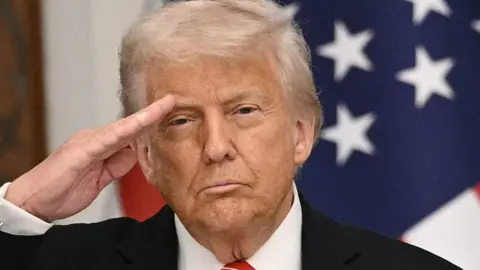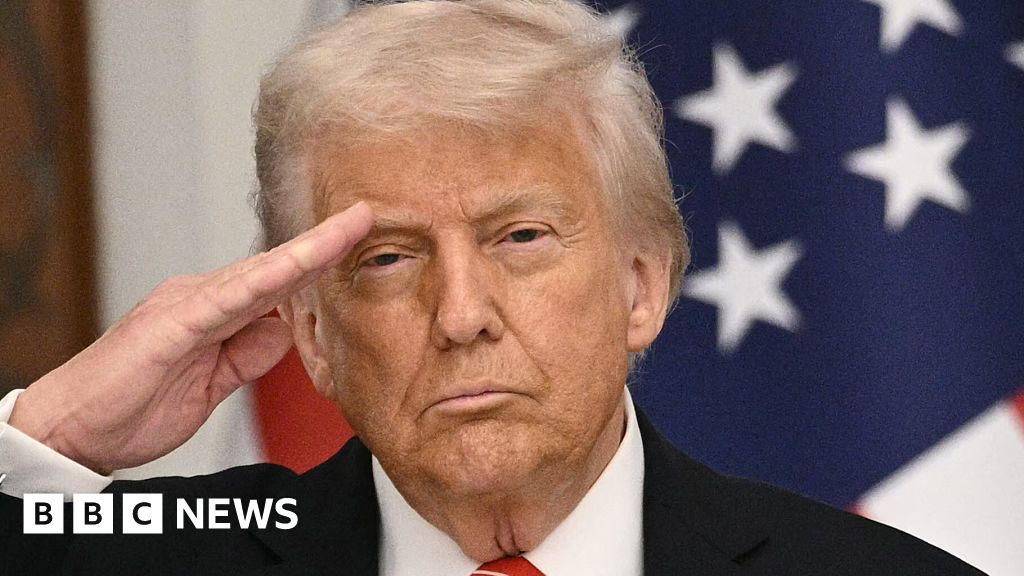Chief international correspondent, BBC News
 Getty Images
Getty ImagesWhen Donald Trump was sworn in as US president for a second time in January, he made a promise. “My proudest legacy will be that of a peacemaker and unifier,” he told his audience at home and far beyond.
Then, a little more than a hundred days on, during his first foreign tour – which took him to three wealthy Arab states – he boasted that he was making good on that vow. “I will tell you that the world is a much safer place right now,” he said in reference to Ukraine. “I think in two or three weeks we can have a much safer place.”
But how much progress is the self-styled “world’s best peacemaker” really making? Is Trump turning the world into a safer, or a more dangerous, place?
There are many angles to the answer.
It is difficult to ignore the reality on the ground in perhaps the world’s two most prominent conflicts.
President Trump boasts that he is the only one who can reach a deal with his Russian counterpart Vladimir Putin – but Russia is now pounding Ukraine with the largest number of drones and missiles since its full-scale invasion in 2022.
And he has repeatedly called for a ceasefire in Gaza, but this week staff at the Red Cross Field Hospital say they are receiving the highest number of weapons-wounded patients since they established their clinic more than a year ago.
On other fronts, however, there are some glimmers of light in the dark.
Nuclear talks between the US and Iran are underway, pushed by an American president who insists that he wants to reach a good deal and avert a bad destructive war.
The next round of those talks, mediated by Oman, is expected to take place on Sunday, although there is intense speculation that Israel may be preparing its own military strikes on Iran.
Syria has more of a fighting chance to tackle dangerous internal tensions, as well as deep poverty, after President Trump suddenly announced last month that punishing sanctions on the country would be lifted on the urging of his Saudi ally.
“It’s the worst of times and the best of times,” David Harland, executive director of the Geneva-based Centre for Humanitarian Dialogue, told me. “There are now more wars than ever in the world, but more conflicts are on the negotiating table and some are moving forward.”
There is truth in Trump’s claim that only he can bring some players to talk peace. He is the only world leader that Putin and Israel’s Prime Minister Benjamin Netanyahu, among others, know they need to listen to – or else.
“You bet, they’re scared of him,” said K. T. Mcfarland, Trump’s former deputy national security adviser who will join a BBC World Service debate on whether the president is making the world safer or more dangerous that will be broadcast on Friday.
His motto “peace through strength” rests on his belief that his sheer force of personality, bold threats, and direct telephone calls can end wars. He even said he could end wars in a day – but clearly hasn’t.
Trump has, however, pushed Russian and Ukrainian officials back to the negotiating table, but there’s been little progress beyond some important prisoner swaps. President Putin shows no signs he is ready to end this grievous war.
Trump’s threats of “hell to pay” ultimatums to Hamas, as well as pressure on Israel, helped get a Gaza ceasefire deal over the line in January, even before he was sworn into office on 20 January. But the truce, described by Trump as “epic”, collapsed in March.
“He doesn’t like to get into the detail,” one Arab diplomat told me, underlining the president’s preference for quick easy deals in what are deeply complex conflicts.
“We all want deals, but we know deals don’t work or don’t last, if they’re not peace deals, as opposed to end-of-war deals,” said Martin Griffiths, a former UN Under-Secretary General who is now the Executive Director of Mediation Group International.
Trump, who prides himself on being the world’s disruptor-in-chief, has also dissed the skills of seasoned career diplomats. “They may know the rivers, the mountains, the terrain, but they don’t know how to do a deal,” he said.
Instead, his preference is to use the deal-makers of his own property world, most of all his golf buddy and former real estate lawyer and investor Steve Witkoff, who is juggling all the tortuous and tricky files on Ukraine, Gaza, Iran, and more.
President Trump’s Make America Great Again crusade goes beyond individual deals. He has run roughshod through the rules-based world order that forged the foundation for global stability and security in the aftermath of World War II.
His repeated threats to seize control of the Panama Canal, buy Greenland, and turn Canada into the 51st US state have stunned – and scared – capitals the world over.
His steep tariffs imposed on both ally and adversary have unleashed retaliatory taxes and fears of a debilitating global trade war, while also straining age-old international alliances.
But he’s also galvanised others, including in the NATO military alliance – whose own chief is now amplifying Washington’s order for members to significantly step up their own military spending.
The American president also took credit for a ceasefire brokered between India and Pakistan after days of cross-border strikes between the neighbours last month. The US’s belated intervention made a big difference, but many other players pitched in.
His business-oriented “America First” approach has also meant that other conflicts, including the terrible killing fields in Sudan, are not beeping loudly on his own radar.
But warring sides in many regions are now courting him, wielding their mineral wealth and investment potential as a bargaining chip. The president’s proposed security-for-minerals deal in war-torn Congo, for example, has provoked a chorus of concern that it doesn’t tackle the root causes of the conflict.
“If you could use a mineral deal to end decades of war, then there are countries who would have fixed that already,” International Crisis Group President Comfort Ero said.
His administration’s cuts to UN aid agencies, and his dismantling of the American aid agency USAID, have also deepened the suffering of displaced and marginalised people in many regions and exacerbates tensions.
And, after only a few months of his second presidency, Trump’s frustration with intransigent actors has led him to issue threats to “take a pass” and walk away from conflicts like Ukraine.
“Deals take forever,” Martin Griffiths, the former UN Under-Secretary General, told me. “You have to start and you have to stay.”
The BBC World Service Debate – Is Donald Trump making the world safer or more dangerous?
The BBC World Service Debate considers the rapidly changing international landscape during Trump’s presidency. Chief International Correspondent Lyse Doucet is joined by a panel of guests to discuss whether the new international order emerging will make the world a safer place.
You can watch the debate on the BBC News Channel at 21:00BST on Friday 13 June and it will be streamed on the BBC News website. It will air on BBC Radio 5Live and World Service radio on Saturday 14 June.
(Except for the headline, this story has not been edited by PostX News and is published from a syndicated feed.)


